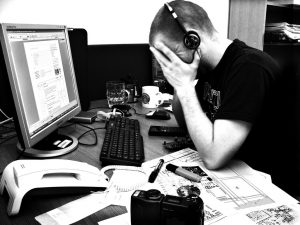When you apply for a job, the first place your application letter hits is the HR department. This is the department which looks after hiring, firing and everything in between. They’re the people who run your payroll, screen applications from new employees and get involved with appraisals or disciplinaries. Most people think they know how HR works and what they spend their time doing. But this isn’t always true. So what is going on in your company’s personnel department?
The HR Department is often snowed under
 If there’s a recruitment drive on, the HR team can be snowed under with work. It’s not uncommon for a vacancy to attract dozens, if not hundreds of applications. Someone has to read each covering letter and CV, draw up shortlists and arrange interviews. After the interviews, HR might get involved in chasing references or helping applicants apply for a DBS check. It’s a busy, hectic place. Bear this in mind if you need to call or email in connection with an application. Be friendly and polite. The opinion of the person you speak to may be used when deciding whether to offer you the job, or not.
If there’s a recruitment drive on, the HR team can be snowed under with work. It’s not uncommon for a vacancy to attract dozens, if not hundreds of applications. Someone has to read each covering letter and CV, draw up shortlists and arrange interviews. After the interviews, HR might get involved in chasing references or helping applicants apply for a DBS check. It’s a busy, hectic place. Bear this in mind if you need to call or email in connection with an application. Be friendly and polite. The opinion of the person you speak to may be used when deciding whether to offer you the job, or not.
They can use software to do some of the recruitment for them
As staff are so busy, many larger businesses have invested in nifty computer software to share the load. This type of software “reads” your application and CV electronically, scanning for elements which match the advertised job description. If you’re rejected by the software, you’ll get an automatic rejection letter without anyone ever looking at your CV. So don’t be tempted just to send out the same generic letter for every job. Take time to craft an individual response, using the same keywords and expressions as the company used in the advert.
Yes, they do check your social media
Many applicants think that it’s a bit of a myth that companies spend their time looking at your holiday pics on Facebook. They might not have time to scan everyone’s social media feed, but if they’re considering inviting you for interview, they probably will. Use the “granny” test – if you wouldn’t be happy for your granny to see all your posts on social media, delete them. Certainly get rid of any posts bad mouthing previous employers. In fact, it’s best to have a policy of just not posting anything work-related on social media. It’s too easily misconstrued or taken out of context.
HR aren’t on your side
At the end of the day, the HR officers in your organisation are just like you, working for senior management and trying to pay the bills. They don’t take sides when it comes to disagreements between staff and their managers. Their remit is to protect the company and hire the best people possible, not to look out for your interests. A good HR officer can be a good source of unbiased, expert information about pensions or maternity leave. But they won’t ever give out advice which goes against the best interests of the company and its shareholders.